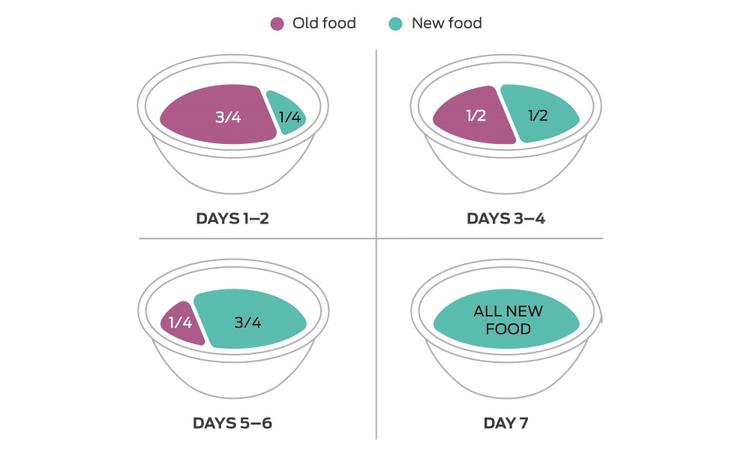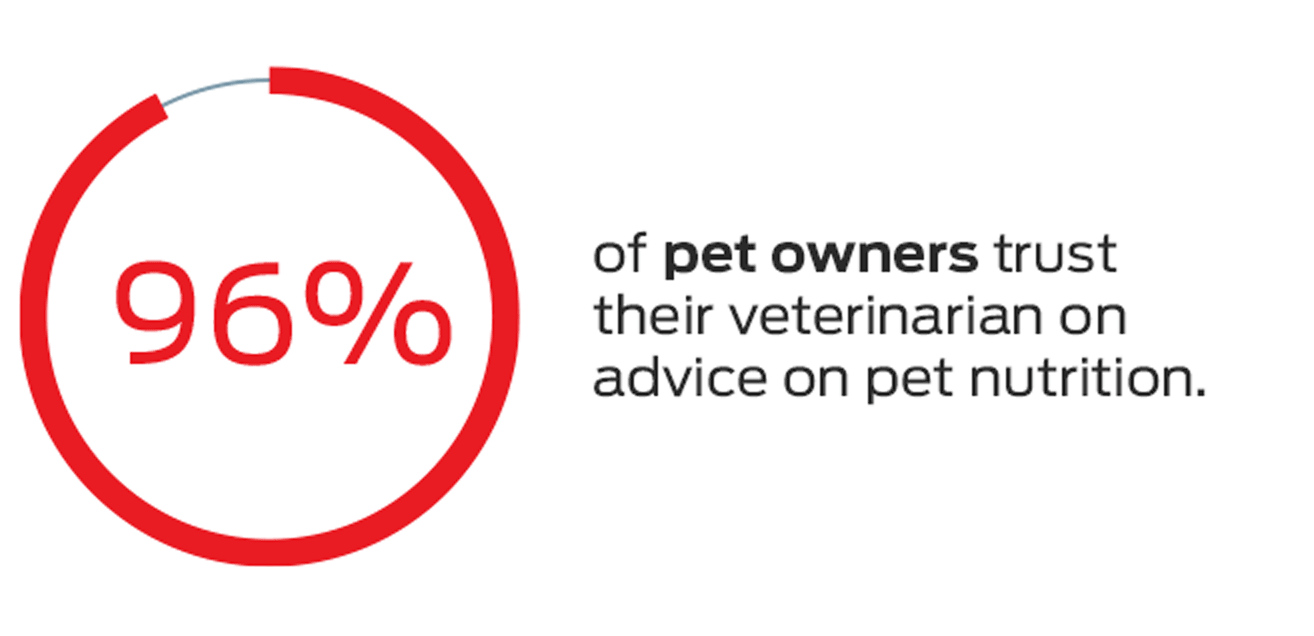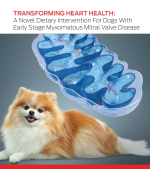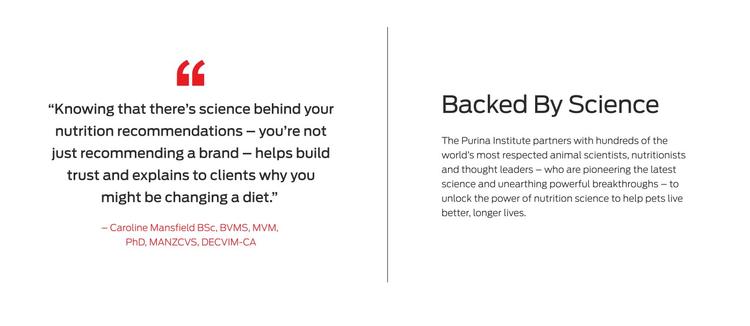


Introducing the Purina Institute Handbook of Canine and Feline Clinical Nutrition
- Provides practical tips and tools to help busy veterinary teams incorporate nutrition into the management of common conditions
- Helps facilitate nutrition conversations with owners of dogs and cats with acute and chronic health conditions
- Written by over 40 global experts in veterinary nutrition, internal medicine, cardiology, dermatology, emergency and critical care, and more
Receive this FREE Ebook when you sign up for scientific communications from Purina Institute.


Cardiac disease is one of the most common disorders in dogs and cats.
Studies report that approximately 10% of dogs and 15% of cats have cardiac disease. The majority of cats suffer from cardiomyopathies. In dogs, the smaller breeds are most likely to have myxomatous mitral valve disease (MMVD) while larger breeds tend to develop dilated cardiomyopathy.1–4
Despite having heart disease, cats and dogs often appear healthy until their heart is failing. The early stages of disease may go undetected unless pets get diagnosed during a veterinary exam scheduled for a non-cardiac reason.1, 5, 6
The American College of Internal Veterinary Medicine (ACVIM) identifies four stages of heart disease in cats with cardiomyopathy or dogs with myxomatous mitral valve disease. Each stage is based on clinical and echocardiographic exams, and then linked with treatment targeted at managing clinical signs. Accurately identifying the stage of heart disease is important for treatment and prognosis.1, 7
Heart failure refers to the clinical signs that develop when the heart can no longer pump enough blood to meet the body’s needs. Once congestive heart failure (CHF) develops, pets have a significantly shortened life span.4, 8, 9
Read on to learn about research that may help veterinarians better predict heart disease progression or find new roles for nutrients in pets with heart disease.

Explore CentreSquare from the Purina Institute – a toolkit of resources that facilitates client-friendly pet nutrition conversations. Whether you have 5 minutes or 30 minutes, you will find something helpful and relevant on CentreSquare.

Discover the crucial role that microbiomes play in maintaining pet health on the Microbiome Forum and learn about the many facets of microbiome science in a clinically relevant context.

Unlock the science of nutrition to help pets live better, longer lives. Novel discoveries about the molecular-level impact of nutrients have helped reimagine the ways nutrition can impact and improve pet health.
Spanish webcast will take place 15:00 CET and 21:00 ART, 24th June
Italian webcast will take place 13:30 CET, 24th June
Cardiac Conditions
Event participation certificate
Please use the button below to download a certificate of attendance for the event.
Lorem ipsum dolor sit amet, consectetur adipiscing elit, sed do eiusmod tempor incididunt ut labore et dolore magna aliqua. Ut enim ad minim veniam, quis nostrud exercitation ullamco laboris nisi ut aliquip ex ea commodo consequat. Duis aute irure dolor in reprehenderit in voluptate velit esse cillum dolore eu fugiat nulla pariatur. Excepteur sint occaecat cupidatat non proident, sunt in culpa qui officia deserunt mollit anim id est laborum.
Lorem ipsum dolor sit amet, consectetur adipiscing elit, sed do eiusmod tempor incididunt ut labore et dolore magna aliqua. Ut enim ad minim veniam, quis nostrud exercitation ullamco laboris nisi ut aliquip ex ea commodo consequat. Duis aute irure dolor in reprehenderit in voluptate velit esse cillum dolore eu fugiat nulla pariatur. Excepteur sint occaecat cupidatat non proident, sunt in culpa qui officia deserunt mollit anim id est laborum.
Lorem ipsum dolor sit amet, consectetur adipiscing elit, sed do eiusmod tempor incididunt ut labore et dolore magna aliqua. Ut enim ad minim veniam, quis nostrud exercitation ullamco laboris nisi ut aliquip ex ea commodo consequat. Duis aute irure dolor in reprehenderit in voluptate velit esse cillum dolore eu fugiat nulla pariatur. Excepteur sint occaecat cupidatat non proident, sunt in culpa qui officia deserunt mollit anim id est laborum.
Lorem ipsum dolor sit amet, consectetur adipiscing elit, sed do eiusmod tempor incididunt ut labore et dolore magna aliqua. Ut enim ad minim veniam, quis nostrud exercitation ullamco laboris nisi ut aliquip ex ea commodo consequat. Duis aute irure dolor in reprehenderit in voluptate velit esse cillum dolore eu fugiat nulla pariatur. Excepteur sint occaecat cupidatat non proident, sunt in culpa qui officia deserunt mollit anim id est laborum.
Lorem ipsum dolor sit amet, consectetur adipiscing elit, sed do eiusmod tempor incididunt ut labore et dolore magna aliqua. Ut enim ad minim veniam, quis nostrud exercitation ullamco laboris nisi ut aliquip ex ea commodo consequat. Duis aute irure dolor in reprehenderit in voluptate velit esse cillum dolore eu fugiat nulla pariatur. Excepteur sint occaecat cupidatat non proident, sunt in culpa qui officia deserunt mollit anim id est laborum.
Test Title
Key Messages
| TRANSFORMING HEART HEALTH | ADVANCING BRAIN HEALTH | EXTENDING A HEALTHY LIFE |
| PROMOTING GASTROINTESTINAL HEALTH | NEUTRALIZING ALLERGENS | EXPLORING MOLECULAR NUTRITION |
| MANAGING A HEALTHY WEIGHT | ||
Science of Nutrition
| TRANSFORMING HEART HEALTH | ADVANCING BRAIN HEALTH | EXTENDING A HEALTHY LIFE |
| PROMOTING GASTROINTESTINAL HEALTH | NEUTRALIZING ALLERGENS | EXPLORING MOLECULAR NUTRITION |
| MANAGING A HEALTHY WEIGHT | ||
- No single diet or approach to dietary management of chronic enteropathy works for all dogs, even when choosing a food for a diet elimination trial.4,7─9
- Identifying the intestinal origin of diarrhea as small or large bowel or mixed can help guide selection of an appropriate diet.
- Dietary strategies commonly used in general veterinary practices include:4,5,8,10─13
- hydrolyzed or novel protein diets, especially if food allergies or intolerance are suspected
- highly digestible, low-residue (i.e., low fiber) diets
- fiber-enhanced diets if fiber-responsive large bowel diarrhea is suspected
- Exclusive feeding of the recommended diet is essential to diagnosing and managing dogs with food-responsive enteropathy, especially if the underlying cause is food allergy or intolerance.
- Although improvement in dermatological signs often requires a diet elimination trial lasting 8 weeks or longer, improvement in gastrointestinal signs may be seen within 1 to 4 weeks.1,4
- Dogs who respond positively to a hydrolyzed or novel protein diet within the first 4 weeks of a diet trial are categorized as having food-responsive enteropathy.
- Not all dogs with food-responsive enteropathy will respond to a particular food within 1 to 4 weeks. If no response occurs during the initial dietary trial, a second dietary trial that uses a different nutritional approach may be beneficial before considering an antibiotic trial or intestinal biopsies.14
- Studies have shown, following 12 to 14 weeks of feeding an elimination diet after diagnosis, many dogs with food-responsive enteropathy could be gradually transitioned back to their original diet without recurrence of clinical signs.4,5
- Following resolution of clinical signs, some owners may decline to perform the challenge phase of an elimination diet trial to confirm the presence of a food allergy or intolerance. These dogs should be continued on dietary therapy for maintenance of their food-responsive condition.
- Dogs whose clinical signs resolve during an elimination diet trial and relapse upon challenge with the original diet (or its components) should be continued on dietary therapy for maintenance of their food-responsive condition.
Test PDF URL
Test PDF Media URL
Test
Hardbreak
Tag

Learn more about how this novel nutritional intervention can transform the management of heart disease in dogs with early stage MMVD
"Knowing that there’s science behind your nutrition recommendations – you’re not just recommending a brand – helps build trust and explains to clients why you might be changing a diet.”
– Caroline Mansfield BSc, BVMS, MVM, PhD, MANZCVS, DECVIM-CA
Backed by science
The Purina Institute partners with hundreds of the world’s most respected animal scientists, nutritionists and thought leaders – who are pioneering the latest science and unearthing powerful breakthroughs – to unlock the power of nutrition science to help pets live better, longer lives.

Easily Accessible Resources
Explore CentreSquare® from the Purina Institute – a toolkit of resources that facilitates client-friendly pet nutrition conversations. Whether you have 5 minutes or 30 minutes, you will find something helpful and relevant on CentreSquare® test.
MER Calculator for Dogs
Using your patient’s age group with current weight and body condition score, this feeding calculator will provide estimated daily caloric needs to reach or maintain ideal body condition.

DIGEST VOLUME 11
Discover expert insights on healthy aging, including the concept of biological age, nutritional management of sarcopenia, and considerations for digestive health for senior pets.

Nutrition for Pregnant and Lactating Cats and Their Nursing Kittens
Nutrition plays a critical role in successful feline reproduction and in supporting development and growth of healthy kittens before and after birth.

Raw Food Diets
Raw food diets are popular with pet owners but the nutritional benefits are unproven, and most are unaware of the health risks that raw food can pose to pets — and people.
test video for shorts
Nutrition Conversation Tips, Nutritional Assessment
How to Make a Dietary Recommendation for a Healthy Dog
Between what they find on the shelf and recommendations from family, friends, store employees, and online sources, clients are faced with an overwhelming number of dog food choices. Guiding clients to the most appropriate food helps the pet thrive and establishes the veterinary team as a trusted nutrition resource. This role-play video shows how to initiate and engage the client in this important nutrition conversation.
QA accordion NEW1
QA accordion NEW1QA accordion NEW1QA accordion NEW1QA accordion NEW1QA accordion NEW1QA accordion NEW1QA accordion NEW1QA accordion NEW1QA accordion NEW1QA accordion NEW1QA accordion NEW1QA accordion NEW1
QA sectionQA sectionQA sectionQA sectionQA sectionQA sectionQA sectionQA sectionQA sectionQA sectionQA section
QA section
QA sectionQA sectionQA sectionQA sectionQA sectionQA sectionQA sectionQA sectionQA sectionQA sectionQA section
14-Year Life Span Study in Dogs
Smarter Tools, Smarter Care: Redefining Veterinary Medicine With IoT, AI, and Telemedicine
Discover the opportunities and challenges ahead for integrating digital technologies, such as wearable connected devices, artificial intelligence, and telemedicine, into veterinary medicine.
The Impact of AI on Veterinary Diagnostics and Consulting
Explore the advantages and potential complications associated with integration of artificial intelligence-augmented tools and workflows into veterinary medicine during this practical, yet aspirational, session.
Healthcare in the Age of Exponential Technology
Artificial intelligence is having a profound impact on health care. While real-world applications now exist to streamline documentation and client communication, even more exciting digital tools and solutions are on the horizon.
The Dog Aging Project: State of the Science
An update is provided on the investigation into the genetic and environmental determinants of healthy aging in companion dogs, including data collection, analysis, and identification of factors associated with age-related health outcomes.
Lorem ipsum dolor sit amet, consectetur adipiscing elit. Vestibulum quis tempus augue. Integer vehicula mattis purus ut fermentum. Suspendisse pretium, augue non egestas ornare, magna risus auctor neque, eget aliquam arcu turpis at sapien. Duis eget pretium ex, in cursus nisl. Vivamus at semper mauris, ac iaculis eros. Morbi semper quam mattis tortor vestibulum semper. Suspendisse enim nisi, pellentesque non nunc quis, dapibus pretium lectus.
Fusce accumsan ante eu massa vulputate, sed imperdiet ex tempus. Vivamus tortor velit, pharetra quis nunc eget, feugiat viverra metus. Fusce non nisi id nisl congue commodo. Maecenas interdum orci eu purus ullamcorper, et commodo arcu consectetur. Vestibulum ullamcorper at ex eu bibendum. Nunc porta dignissim leo, vitae viverra mauris aliquam vitae. Nulla vitae diam metus. Pellentesque facilisis elementum dolor, ut placerat justo feugiat quis. Quisque fringilla quis libero eget semper. Etiam mollis, enim ac tristique gravida, lorem lectus commodo lorem, eget volutpat lacus nibh et augue.






